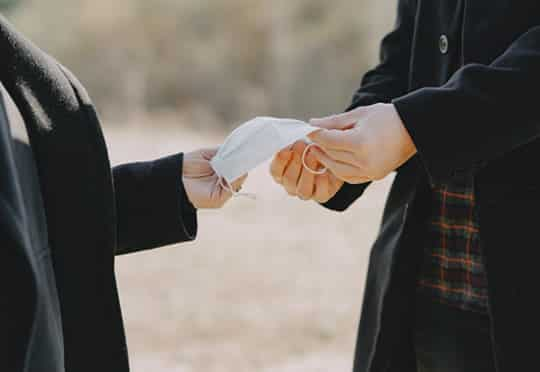The types of face covering that could protect a person from coronavirus transmission risk.
Face masks and any other mouth and nose covers can lower the forward distance transmission risk of COVID-19 by 90 percent.
A group of engineers has examined seven types of protective face masks, such as homemade masks and surgical masks and found that all are effective in minimising COVID-19 spread.
Dr Cathal Cummins, study co-author, explained the results:
“Even our hand-made mask performed very well in preventing the frontal spread of the wearer’s exhaled breath.
While this is positive, wearers of hand-made face masks need to be aware that jets of air can leak out of the sides and back of their masks.
This could be particularly important when using masks on public transport, where sitting behind someone wearing a mask could be more of a hazard than sitting directly facing them.”
However, exhaled air could still escape from the sides and back of some face covers.
A background oriented schlieren (BOS) imaging technique was used to measure the direction and distance that air travels when a person coughs or breathes through a face covering.
The team discovered that all face masks with no outlet valve decrease how far a deep breath travels by over 90 percent.
Respirator masks worn by workers who are exposed to dust provide some protection but the valves could lead to the spread of infectious air in front.
Handmade covers and surgical masks were shown to minimise exhaled air travelling forwards but produced leakage jets below, above, behind, and to the sides.
In particular, strong backward jets were produced by coughing and breathing heavily.
The researchers found that only tight-fitting masks could block virus-filled droplets.
They also found that intense downward jets were discharged when wearing full-face shields only.
The team found that extubation, a routine medical procedure to remove a breathing tube used in patients on ventilators, increases the spread of coronavirus risk.
Coughing due to extubation would put practitioners at extreme risk of the virus as well as anyone close by.
Dr Felicity Mehendale, study co-author, said:
“It was reassuring to see the hand-made mask worked just as well as the surgical mask to stop the wearer’s breath flowing directly forwards.
This suggests that some hand-made masks can help to prevent the wearer from infecting the public.
But, the strong backward jets mean you need to think twice before turning your head if you cough while wearing a mask; and be careful if you stand behind or beside someone wearing a mask.”
The study was published in arXiv (Viola et al., 2020).

